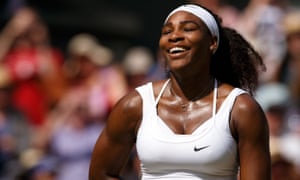by BRYAN ARMEN GRAHAM
 Serena Williams celebrates her sixth Wimbledon title on Saturday PHOTO/Rex Shutterstock/BPI
Serena Williams celebrates her sixth Wimbledon title on Saturday PHOTO/Rex Shutterstock/BPI
It’s been said the black woman in American society has two strikes against her: being born a woman and being born black. No demographic has been more marginalized, oppressed and subjugated throughout the country’s 239-year history.
Which is why Serena Jameka Williams, now beyond any reasonable dispute the greatest ever women’s tennis player after capturing a sixth Wimbledon title and 21st major championship overall on Saturday, is transcending sport into a space we’re only beginning to reckon – past the Jordans, Gretzkys and Messis into the rarified air of Muhammad Ali and Jackie Robinson.
The 33-year-old now holds all four grand slam titles simultaneously, an achievement so rare it became eponymously associated with her – the “Serena Slam” – when she first managed it more than 12 years ago. Yet she remains the ultimate outsider, hardly less today than when she burst on the scene as a braided teenager nearly two decades ago: a black female Jehovah’s Witness from Compton re-writing the record book of a sport predominantly owned, played and watched by affluent white people.
This is the ultimate American folk tale – and it’s still being written in real time.
…
And it’s not just the white middle class that’s threatened by an unapologetically strong black female beating them at their own game. Just turn on the radio – For Everybody by Juicy J and Wiz, I Don’t Mind by Usher – for everyday instances of black culture hating on black women.
Let not the knee-jerk deluge of plaudits seduce us into slighting Serena’s struggle. She fought her way onto the stage amid resistance, derision and criticism from all corners. An open letter in Tennis Magazine from Chris Evert (white woman) in 2006 doubting her commitment, a 2007 eulogy by Pat Cash (white man) declaring her washed up, a breathtaking 2009 screed by Jason Whitlock (black man) that demeaned Williams in sexualized, animalistic language so wildly inappropriate it reads like satire. A federation official (white woman) one day, the sport’s broadcasting commentariat (almost exclusively white) the next.
Even on the morning of Saturday’s final, a New York Times story on women’s tennis and body-image issues – which couldn’t have talked around race more if it had tried – intimated that Serena’s competitors aren’t as good because they “choose” not to be, running with the presumption that being muscular makes you less than a woman.
More sinister are the nameless, faceless critics lurking on social media and comments sections, giving voice to a society’s most hateful impulses. What top champion in any sport has received a fraction of the snide remarks that Williams routinely weathers?
It’s never been just about tennis with Serena. Which makes her leverage of her twin burdens, while dominating three separate eras of conventionally attractive women from far more advantaged backgrounds, all the more heroic. How fortunate she was to find a binary platform – the ball is in or out – where not even the elemental forces aligned against her could deny her what’s rightfully hers, a justice not afforded far too many black women in society. They cannot touch her.
The Guardian for more
